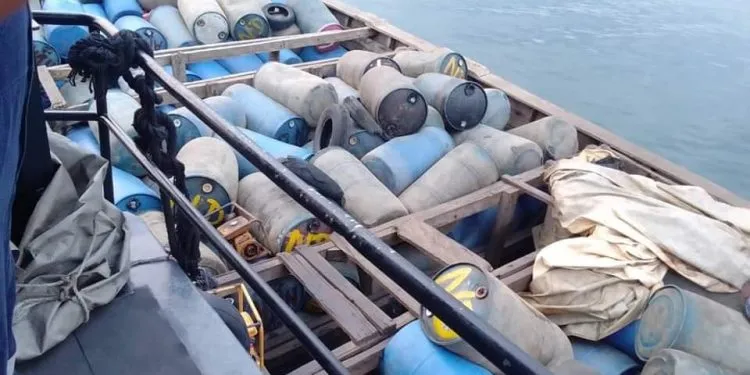By Tata Mbunwe
The Cameroon Navy has intercepted and confiscated 75,000 liters of smuggled fuel in the coastal city of Limbe, in the South West Region.
The operation, carried out on this Saturday morning is part of a broader initiative by Cameroonian authorities to curb the illegal importation of fuel into the country.
The Navy revealed that the operation targeted “a huge canoe coming from a neighboring country to Limbé, carrying 300 barrels of 250 liters, equivalent to 75,000 liters of smuggled fuel, and a crew of 10 people without IDs.”
The intercepted vessel is currently held at the Naval base command post off the coast of Limbe, awaiting further intervention from authorities.
This recent seizure follows a pattern of similar operations conducted by the Navy to combat illegal fuel importation.
On December 11, 2023, the Navy seized 22,500 liters of oil intended for smuggling into Limbe, and just days earlier, on December 7, another operation led to the confiscation of 40,000 liters.
Despite the intensified efforts to crackdown on illegal fuel importation in Cameroon, the illicit trade continues to thrive, particularly in the English-speaking Regions of the country.
A significant portion of the population in these regions relies on roadside fuel, creating a persistent demand for smuggled fuel.
Illicit fuel importation is further caused by the incapacitation of the country’s lone oil refinery, SONARA.
The national oil refinery experienced a fire in 2019, significantly limiting the country’s capacity to refine crude oil.
Consequently, Cameroon has become increasingly dependent on imported fuel, notably from neighboring Nigeria.
The current market price of petrol stands at FCFA 730 per liter at fuel stations.
However, roadside fuel, which is often obtained through smuggling, is available at a lower cost of FCFA 650 per liter, making its demand very high among local consumers.
If fuel prices increase, as it is highly speculated, roadside fuel and illicit importation could gain more steam.
Speculations about a potential rise in fuel prices emerged following President Paul Biya’s announcement in his 2023 end-of-year speech, indicating the government’s intention to slash fuel subsidies.
President Biya argued that fuel subsidies cost the government FCFA 640 billion in 2023, adding that it weighs heavily on public coffers.



